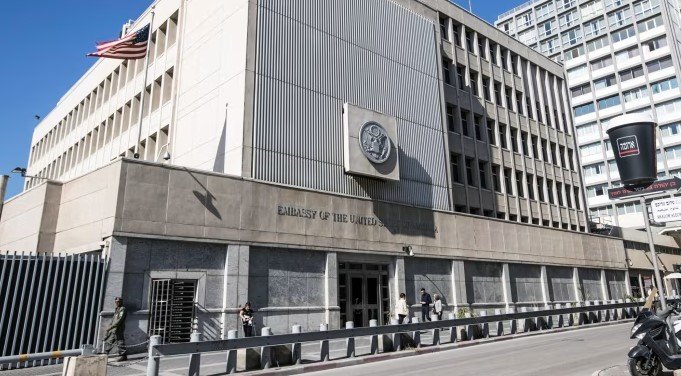A 28-year-old dual U.S.-German citizen, Joseph Neumayer, was taken into custody Sunday at JFK Airport after being deported from Israel. He faces federal charges for trying to firebomb the U.S. Embassy’s Tel Aviv branch.
Neumayer allegedly showed up at the embassy on May 19 with a backpack containing Molotov cocktails and spat on a security guard before fleeing. His arrest has raised concerns over extremist threats against U.S. diplomatic missions.
Attempted Attack Unfolded Outside Tel Aviv Embassy
Neumayer arrived in Israel in April, according to unsealed court documents released by the Department of Justice. His actions on May 19 shocked embassy security staff and authorities alike. Walking up to the embassy carrying a dark backpack, Neumayer spat on a guard without any visible provocation.
When the guard tried to stop him, Neumayer escaped, abandoning the backpack behind. A quick search revealed three rudimentary Molotov cocktails inside — bottles filled with flammable liquids, a crude but dangerous form of improvised incendiary devices.
This wasn’t just a careless prank. The presence of those devices suggests an intent to cause serious harm or destruction. U.S. officials said this type of attack could have had severe consequences if the devices had been ignited.
The FBI swiftly arrested Neumayer in his nearby hotel room just five blocks from the embassy. The incident exposed vulnerabilities in embassy security but also highlighted quick response measures by law enforcement.

Social Media Threats Paint a Dark Picture
Perhaps even more disturbing were Neumayer’s posts on social media. Earlier that day, he allegedly wrote: “join me as I burn down the embassy in Tel Aviv. Death to America, death to Americans, and f—k the west.” This message wasn’t just hostile—it was a direct call to violence.
Investigators also found other online posts where Neumayer threatened to assassinate former President Donald Trump and made threats against billionaire Elon Musk. Such statements reveal a deeply troubled mindset with violent and extremist views.
This raises questions about the role of social media platforms in monitoring and managing threats. Neumayer’s public posts were openly violent and hateful, yet somehow remained accessible before his arrest.
Charges and Possible Penalties Await Neumayer
The Justice Department charged Neumayer with attempting to destroy U.S. government property through fire or explosives. Federal law carries serious penalties for such crimes, including:
-
A minimum prison sentence of five years.
-
A maximum prison sentence of up to 20 years.
-
Potential fines up to $250,000.
Officials have not disclosed whether Neumayer had any accomplices or was part of a larger network. His motive remains unclear beyond the hateful rhetoric seen online. But authorities have made it clear they intend to prosecute aggressively to deter similar attacks.
Rising Concerns Over Security of U.S. Diplomatic Missions
Embassies worldwide have increasingly become targets for politically motivated attacks and protests. The U.S. State Department has repeatedly warned about the risk posed by extremists and lone actors.
This incident in Tel Aviv underscores how even highly secured diplomatic sites can be threatened by individuals willing to use violence. It also raises ongoing debates about balancing security with open access at embassies.
The uptick in such attacks globally is worrying for diplomats and host countries alike. Each incident demands new security protocols, additional resources, and heightened vigilance.
What’s Next in the Investigation?
Neumayer’s arrest is just the beginning. Authorities will look into how he obtained materials for the Molotov cocktails and whether he received any outside help. His background and travel history will also be scrutinized.
The FBI and Department of Justice are coordinating closely with Israeli counterparts to learn more about his time in the country and his motives. This cooperation is crucial for preventing future incidents.
The case also raises broader issues about how countries protect embassies and their staff. Ensuring safety while allowing diplomatic missions to function openly remains a challenging balance.
